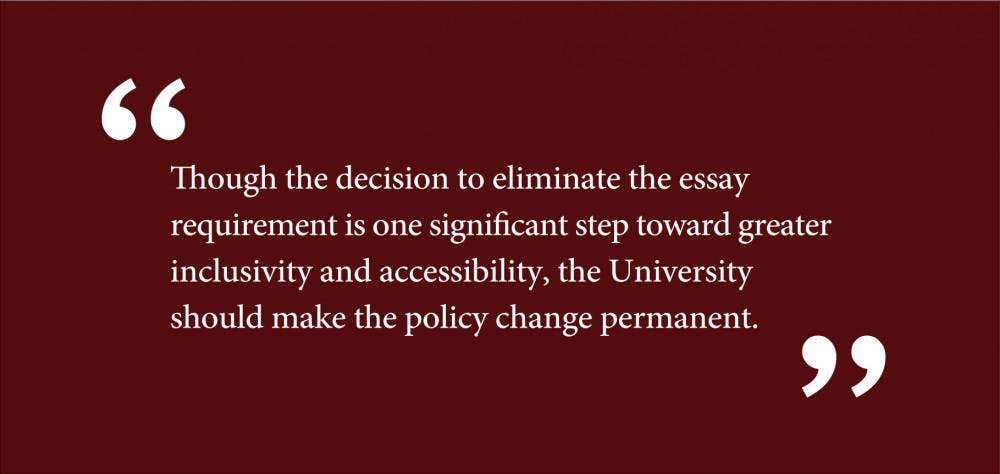In July, the University announced it will no longer require applicants to the class of 2023 to submit their scores for the essay portions of the SAT and ACT. According to Dean of Admission Logan Powell, the requirement may have discouraged low-income students who rely on free, school-day SAT testing from applying to the University, since not all SAT tests administered during the school week offer a writing component. Incoming applicants who take a non-essay standardized exam are “encouraged,” but not required, to submit a graded paper from a high school humanities course instead. We applaud the decision to remove the writing score requirement from the University’s admission policy and the efforts to critically examine the ways in which Brown can be made more accessible to those traditionally underserved and marginalized by existing college admission processes.
The writing portion of the ACT has been optional since the exam’s inception. Over a decade ago, the College Board included a 25-minute essay in the SAT and raised the highest possible score from 1600 to 2400. In March 2016, the College Board made the essay portion optional, doubled the amount of time for the essay and removed its traditional writing prompts, instead asking test-takers to analyze a given passage. But, because variations of the tests that include an optional writing section cost more, 30 percent of school-day SAT exams and half of school-day ACT exams do not include the essay, potentially dissuading some students from applying to schools with more onerous testing requirements. Some estimates suggest that fewer than 25 universities still require writing scores from standardized exams.
The University previously dropped the essay requirement for those seeking admission to the Class of 2021. In lieu of a writing score, the University asked applicants to send either their SAT score and two SAT subject test scores, or their ACT score. Dean of Admission Jim Miller ’73 said of the decision, “We know that tests are stressful and time consuming, and for some people they can be a significant expense. So we want to make sure we’re doing what is in the best interest of the applicants.” The writing section of the ACT was still “strongly recommended” by the Office of Admission.
For the Class of 2022, the University reinstated the writing score requirement for the SAT and ACT. (The University also recommended, but did not require, that applicants take two SAT subject tests.) Powell, who became Dean of Admission in the summer of 2016, cited concerns that applicants were not registering for the exams in time for application deadlines. He also noted that the Office of Admission would use the writing scores to “see how the scores line up with (its) sense of the student’s writing ability” and assess whether applicants “can craft strong, logical, evidence-based arguments,” but that the Office might “adjust (its) policy” later.
The essays included in the SAT and ACT have long been the objects of fierce criticism. A previous Herald editorial noted that “the essay format disproportionately favored students who came from higher socioeconomic backgrounds and the score seemed to not correlate with eventual success in college.” According to a 2004 investigation conducted by the College Board, the introduction of the essay and the subsequent lengthening of the exam resulted in test-takers reporting higher levels of fatigue. Further, critics have called into question the essays’ utility in predicting applicants’ postsecondary academic performance, since students generally have several days — along with the ability to gather facts, outline, revise and cite — to write essays in college. Fairness in grading also became a point of concern: In the past, scorers of the SAT, for example, had only three minutes to evaluate the merits of each essay and did not assess the factual accuracy of students’ arguments and evidence.
To be sure, the alternative to the writing requirement — a graded essay written for a class — implemented by the University is not without its own set of potential complications. For example, low-income students may not have the resources, such as writing centers or libraries designed for extensive research, that higher-income students might have. Though the decision to eliminate the essay requirement is one significant step toward greater inclusivity and accessibility, the University should make the policy change permanent, applicable to all future applicants to Brown. And, going forward, it must take unflagging care to ensure that its alternatives do not inadvertently perpetuate the same systemic disadvantages calcified by standardized exams.
Editorials are written by The Herald’s editorial page board: Anuj Krishnamurthy ’19, Rhaime Kim ’20, Grace Layer ’20, Mark Liang ’19 and Krista Stapleford ’21. Please send responses to this opinion to letters@browndailyherald.com and op-eds to opinions@browndailyherald.com.





